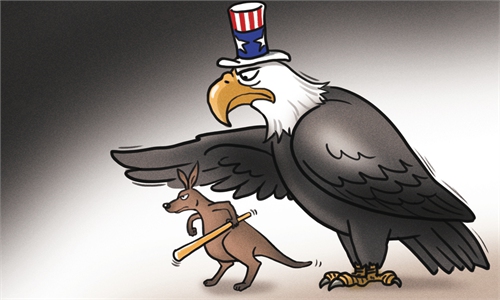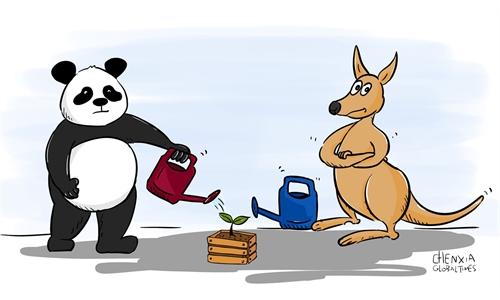
Illustration: Chen Xia/Global Times
In recent weeks, some banks have received mandates from Chinese companies looking at Australian assets, in a move which could be seen as evidence that Chinese firms are showing renewed interest in Australian acquisition targets, but "the signs are still tentative," Reuters reported on Wednesday.In the past few years, China-Australia relations have encountered some difficulties, which we didn't want to see. Following the current Australian government coming to power, it signaled its intention to ease the relationship between the two countries, and this has shored up the confidence of business communities on both sides.
It's particularly noteworthy that Australian businesses are keen to explore practical ways in which they can attract Chinese investment and enjoy the dividends of China's consumer market. In recent months, several media outlets have published articles suggesting there have been increasingly more positive signs in bilateral trade and investment. This trend is a good thing for both the Australian and Chinese economy, but we should avoid being over-optimistic. There is still a long way to go to eliminate hidden dangers and bring bilateral economic cooperation back to previous warmth.
There's a need to continue to repair Australia's relationship with China by focusing on areas of common interest, but Canberra is playing a dangerous game by moving in the opposite direction. Not long after several Australian lawmakers' visit to the island of Taiwan has cast a shadow on the China-Australia relationship, the US and Australia said recently they would invite Japan into three-way rotations, vowing a united front in the face of "China's dangerous and coercive actions throughout the Indo-Pacific," according to media reports.
At a time when China-Australia economic relations have just shown some positive signs, recent moves taken by the Australian side will undoubtedly set unnecessary obstacles in the way of bilateral trade and investment. This is not a so-called "economic coercion," but basic economic common sense. If Australia cannot create a positive geopolitical atmosphere for trade and investment cooperation, global investors will increasingly choose to vote with their feet to avoid being drawn into geopolitical tensions.
As the world has entered a period of turbulence and the global economy is facing a challenging outlook, boosting economic growth should be a priority for the Australian government. Australia's economy slowed slightly in the September quarter as sky-high prices and rising interest rates sapped consumer spending power, according to media reports. Some analysts predict that Australia's economic growth will likely to slow sharply during the next financial year.
China remains Australia's largest trade partner and has imported a variety of products from Australia, so both countries have a strong trade complementarity. Improving China-Australia relations is in the fundamental interest of both sides. We hope efforts will be made by Canberra to rebuild trust between the two countries and bring bilateral relations back on track, especially when the economy battles headwinds from high inflation and rising interest rates. Otherwise, a deterioration in bilateral relations will undoubtedly produce negative economic impacts on trade, investment and other sectors, setting new barriers for economic growth.
Chinese Foreign Ministry spokesperson Mao Ning said on Tuesday that the Australian side should stop all forms of official interaction with the Taiwan region and stop sending wrong signals to the "Taiwan independence" separatist forces.
Australia should stop playing with fire before business communities lose confidence in a warming up of economic ties between the two countries. A number of actions by the current Australian government have led business communities to believe that Australia is changing its China policy to one which is more pragmatic and conductive to stabilizing economic ties. Once business communities lose confidence, renewed pessimism among investors will set barriers that hurt not only bilateral economic relations but also the Australian economy.
The author is a reporter with the Global Times. bizopinion@globaltimes.com.cn



